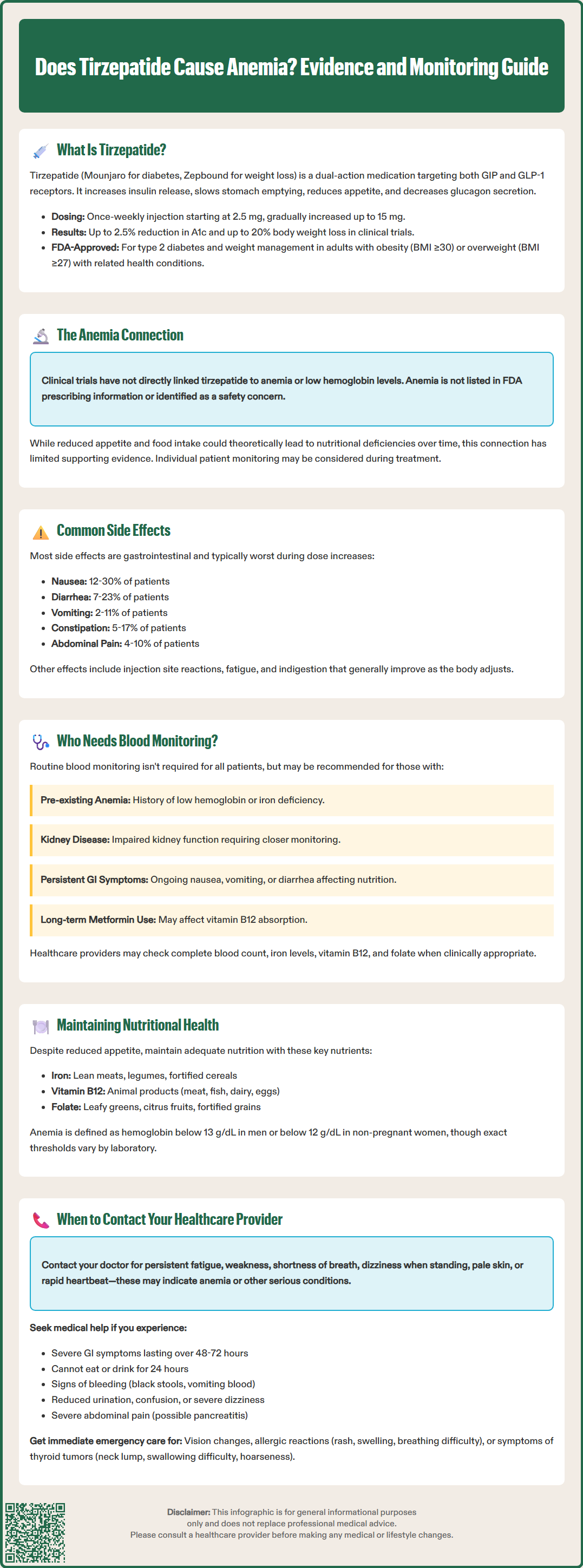LOSE WEIGHT WITH MEDICAL SUPPORT — BUILT FOR MEN
- Your personalised programme is built around medical care, not willpower.
- No generic diets. No guesswork.
- Just science-backed results and expert support.
Find out if you’re eligible

Does tirzepatide cause anemia? This question concerns patients and clinicians considering this dual GIP/GLP-1 receptor agonist for type 2 diabetes or weight management. Tirzepatide (Mounjaro, Zepbound) is not directly associated with anemia based on FDA prescribing information and clinical trial data. However, its gastrointestinal effects and impact on appetite may theoretically affect nutritional intake in some individuals. Understanding the relationship between tirzepatide and blood health helps patients and providers make informed treatment decisions and recognize when monitoring may be appropriate. This article examines the evidence, common side effects, and practical guidance for patients taking tirzepatide.
Quick Answer: Tirzepatide does not directly cause anemia according to FDA prescribing information and clinical trial data.
Tirzepatide is a dual glucose-dependent insulinotropic polypeptide (GIP) and glucagon-like peptide-1 (GLP-1) receptor agonist approved by the FDA for the treatment of type 2 diabetes mellitus (under the brand name Mounjaro) and chronic weight management (under the brand name Zepbound). For weight management, Zepbound is indicated for adults with obesity (BMI ≥30 kg/m²) or overweight (BMI ≥27 kg/m²) with at least one weight-related comorbidity.
The medication works through a dual mechanism of action. As a GIP receptor agonist, it enhances insulin secretion and may improve insulin sensitivity while reducing glucagon secretion. Simultaneously, its GLP-1 receptor agonist activity promotes glucose-dependent insulin release, slows gastric emptying, and reduces appetite through central nervous system pathways. This combined approach results in improved glycemic control and weight loss in clinical trials.
Tirzepatide is administered as a once-weekly subcutaneous injection, with dosing typically initiated at 2.5 mg (a starting dose for tolerability, not intended for glycemic control) and gradually titrated upward based on therapeutic response and tolerability. The maximum approved dose is 15 mg weekly. Clinical trials have demonstrated significant reductions in hemoglobin A1c levels (up to 2.5% reduction in SURPASS trials for type 2 diabetes) and body weight (up to 20% reduction in SURMOUNT trials for obesity without diabetes) compared to placebo and other medications.
Understanding tirzepatide's mechanism is important when evaluating potential adverse effects, including questions about whether it may affect blood parameters such as hemoglobin levels or cause anemia. While not directly associated with anemia in clinical trials, clinicians may consider individual patient factors when determining appropriate monitoring during treatment.
The most frequently reported adverse effects of tirzepatide are gastrointestinal in nature, consistent with the GLP-1 receptor agonist class of medications. According to FDA prescribing information, these effects include nausea (12-30%), diarrhea (7-23%), vomiting (2-11%), constipation (5-17%), and abdominal pain (4-10%), with rates varying by dose and indication. These gastrointestinal symptoms are typically most pronounced during dose escalation and often diminish over time as patients develop tolerance.
Other common adverse effects include decreased appetite, which is therapeutically desirable for weight management but requires monitoring to ensure adequate nutritional intake. Injection site reactions such as erythema, pruritus, or mild discomfort may occur. Fatigue and dyspepsia have also been reported in clinical trials.
Regarding anemia specifically, there is no established causal relationship between tirzepatide and the development of anemia based on current clinical evidence. Anemia is not listed as an adverse effect in the FDA-approved prescribing information for either Mounjaro or Zepbound. Clinical trials evaluating tirzepatide did not identify anemia as a significant safety signal compared to placebo or active comparators.
However, the gastrointestinal effects and reduced food intake associated with tirzepatide could theoretically contribute to nutritional deficiencies over time if dietary intake becomes inadequate. This mechanism remains theoretical with limited supporting evidence. Additionally, many patients with type 2 diabetes take metformin, which can cause vitamin B12 deficiency with long-term use and potentially contribute to anemia.
Important safety considerations for tirzepatide include a boxed warning for risk of thyroid C-cell tumors (including medullary thyroid carcinoma), and warnings regarding pancreatitis, gallbladder disease, acute kidney injury with dehydration, and increased hypoglycemia risk when used with insulin or sulfonylureas.

Patients taking tirzepatide should be educated about symptoms that warrant prompt medical evaluation. While anemia is not a recognized direct effect of tirzepatide, symptoms suggestive of anemia or other concerning conditions require clinical assessment.
Contact your healthcare provider if you experience:
Persistent fatigue or weakness that interferes with daily activities or worsens over time, particularly if accompanied by other symptoms
Shortness of breath with minimal exertion or at rest, especially if this represents a change from your baseline
Dizziness or lightheadedness, particularly upon standing, which could indicate orthostatic hypotension or anemia
Pale skin, nail beds, or mucous membranes, which may suggest reduced hemoglobin levels
Rapid or irregular heartbeat (palpitations or tachycardia), as the cardiovascular system may compensate for reduced oxygen-carrying capacity
Severe or persistent gastrointestinal symptoms including intractable nausea, vomiting, or diarrhea lasting more than 48-72 hours, as these may lead to dehydration and nutritional deficiencies
Inability to maintain adequate oral intake of food or fluids for more than 24 hours
Signs of gastrointestinal bleeding such as black, tarry stools or vomiting blood or coffee-ground material
Symptoms of thyroid tumors including a lump or swelling in your neck, difficulty swallowing, hoarseness, or shortness of breath
Signs of gallbladder problems such as pain in your upper stomach (abdomen), fever, yellowing of skin or eyes (jaundice)
Symptoms of hypoglycemia (especially if taking insulin or sulfonylureas), including shakiness, dizziness, sweating, confusion, or irritability
Reduced urine output, confusion, or severe dizziness which may indicate dehydration or acute kidney injury
Additionally, seek immediate medical attention for symptoms of serious complications including severe abdominal pain (which could indicate pancreatitis), visual changes (potential diabetic retinopathy progression), or signs of allergic reaction such as rash, swelling, or difficulty breathing.
While routine hematologic monitoring is not specifically mandated for all patients taking tirzepatide, healthcare providers may recommend individualized monitoring based on patient risk factors and clinical presentation.
Laboratory evaluation may be considered for:
Patients with pre-existing anemia or history of hematologic disorders
Individuals with chronic kidney disease, as this population has increased risk of anemia
Those experiencing persistent gastrointestinal symptoms affecting nutritional intake
Patients with inadequate dietary intake or suspected nutritional deficiencies
Older adults or those with multiple comorbidities
Patients taking metformin long-term, as the American Diabetes Association notes it can cause vitamin B12 deficiency
Potential monitoring parameters may include complete blood count (CBC) with differential, iron studies (serum iron, ferritin, total iron-binding capacity), vitamin B12 levels, and folate levels when clinically indicated. For patients with type 2 diabetes, routine monitoring of hemoglobin A1c (every 3-6 months), renal function (serum creatinine, estimated glomerular filtration rate), and lipid panels should continue as per standard diabetes care guidelines.
Anemia is defined as a hemoglobin level below normal range (generally <13 g/dL for men and <12 g/dL for non-pregnant women), though specific thresholds may vary by laboratory and patient factors.
Patients should be counseled on maintaining adequate nutritional intake despite reduced appetite. A balanced diet rich in iron (lean meats, legumes, fortified cereals), vitamin B12 (animal products, fortified foods), and folate (leafy greens, citrus fruits) supports healthy red blood cell production. For individuals struggling with food intake due to medication side effects, consultation with a registered dietitian may be beneficial.
Healthcare providers should maintain a low threshold for investigating unexplained fatigue or other symptoms potentially attributable to anemia, recognizing that while tirzepatide does not directly cause anemia, the metabolic and gastrointestinal changes it produces could theoretically affect nutritional status in some individuals. Regular clinical assessment and patient education remain essential components of safe tirzepatide therapy.
No, anemia is not listed as an adverse effect in FDA prescribing information for tirzepatide (Mounjaro or Zepbound), and clinical trials have not identified it as a significant safety concern compared to placebo or other medications.
Routine blood monitoring for anemia is not required for all patients, but your healthcare provider may recommend testing if you have pre-existing anemia, chronic kidney disease, persistent gastrointestinal symptoms, or other risk factors.
Contact your healthcare provider if you experience persistent fatigue, shortness of breath with minimal exertion, dizziness, pale skin, rapid heartbeat, severe gastrointestinal symptoms lasting more than 48-72 hours, or inability to maintain adequate food or fluid intake.
All medical content on this blog is created using reputable, evidence-based sources and is regularly reviewed for accuracy and relevance. While we strive to keep our content current with the latest research and clinical guidelines, it is intended for general informational purposes only.
This content is not a substitute for professional medical advice, diagnosis, or treatment. Always consult a licensed healthcare provider with any medical questions or concerns. Use of this information is at your own risk, and we are not liable for any outcomes resulting from its use.